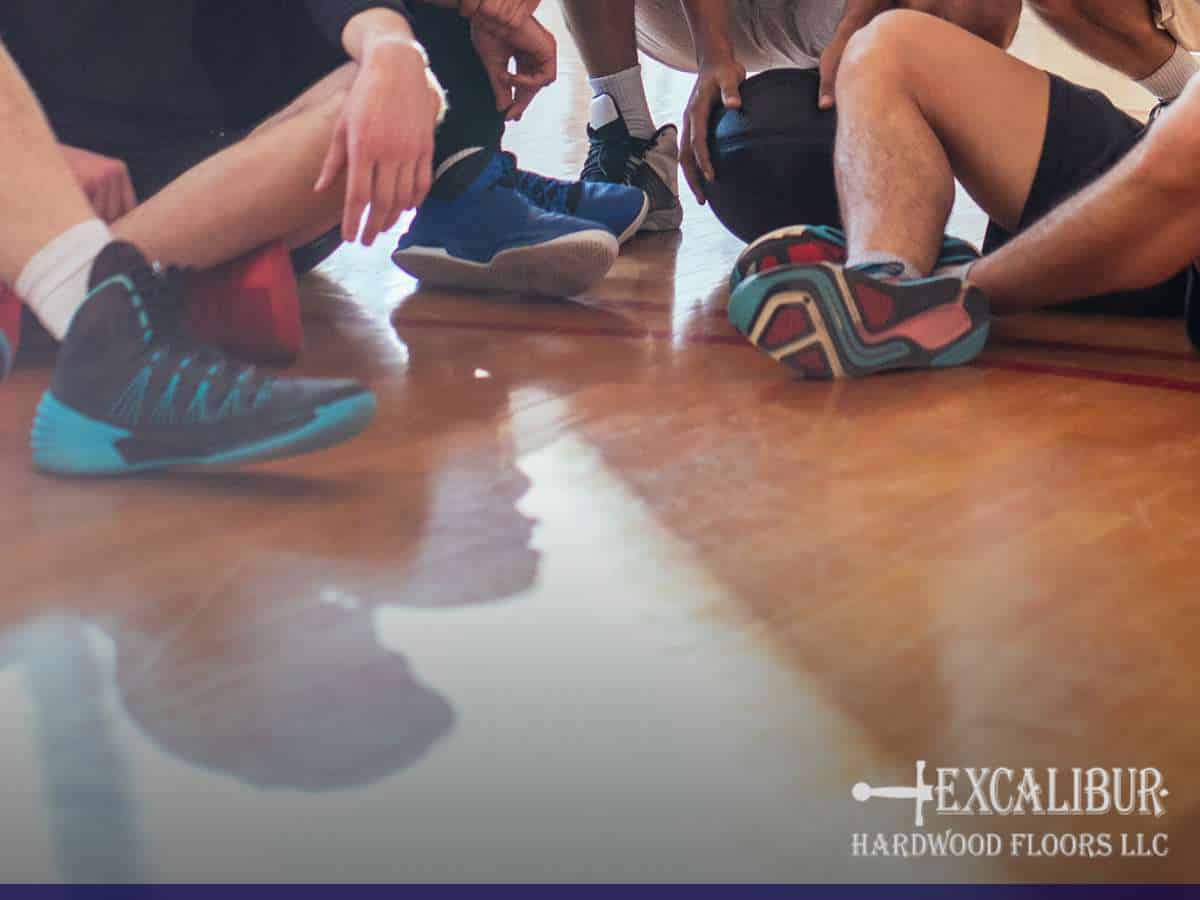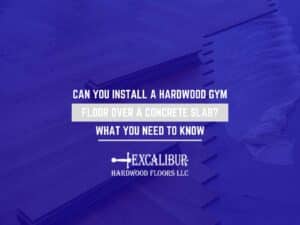Does Your Gym Floor Squeak Or Shift? Here’s What Might Be Wrong
Common Causes Of Squeaky Or Shifting Gym Floors & How To Fix Them
Gym floors are essential for any sports facility because they offer a reliable surface for games, practices, and events. However, a squeaky gym floor is a common issue that can really disrupt activities. Luckily, there’s a solution.
In this article, we’ll discuss the most common causes and what you can do to fix them. Whether you need a gym floor repaired or replaced, we’ll provide the details below.

Top Causes Of Squeaky Or Shifting Gym Floors
A squeaking or shifting gym floor, particularly in a weight room, can be caused by different factors, including loose hardware, excess moisture, and uneven subfloors. Let’s check some of the most common:
1. Loose Hardware
Over time, floorboards may loosen due to constant foot traffic and repeated impact. Nails or fasteners can become dislodged, causing boards to rub against each other and produce squeaking sounds.
2. Subfloor Separation
A shifting floor might mean the subfloor isn’t properly bonded to the surface layer. If there’s a gap between the floor system layers, it can cause noise, movement, and it can cause squeaking, movement, or sagging in certain areas.
3. Moisture Issues
Humidity changes or water leaks can warp the wood or damage adhesives underneath the floor. This leads to expansion, contraction, and shifting. In fact, moisture is usually one of the most common (and most serious) culprits of squeaky or shifted floors.
4. Faulty Installation
If the flooring wasn’t installed with the right spacing, support system, or moisture barrier, it may never have had the stability it needed. Poor installation practices often lead to early problems like movement or noise, which is why proper gym floor installation by experienced professionals is essential.
5. Subfloor Or Foundation Issues
If the problem is deeper—literally speaking—it could be due to uneven concrete, rotting joists, or structural weaknesses below the floor system. These issues may cause sections of the floor to sink or flex when walked on.
6. Environmental Factors
Changes in temperature and humidity can make wood expand or shrink. Without proper expansion gaps or climate control, this natural movement can lead to buckling, shifting, or squeaking.
Safety & Performance Risks Of a Noisy Gym Floor
A noisy gym floor isn’t just a cosmetic issue, it can pose risks to athletes as well. It can also turn any practice or event into a frustrating experience due to the constant squeaky noise.
It’s worth noting that squeaky floors aren’t all bad. Sometimes that noise is completely normal, and it can indicate some positive aspects of your gym floor, such as improved traction, enhanced player awareness, and immediate feedback, as it can help them adjust their movements quickly.
But a constant squeaky noise in your floor may indeed indicate something more serious (as we mentioned before). Additionally, it can cause some performance and safety risks, such as:
- Higher chances of trips and falls
- Joint stress and injury risks
- Inconsistent ball bounce and surface grip, especially for sports like volleyball or basketball
- Disruption during activities, as it can make it harder to concentrate and communicate
- Long-term structural damage (by ignoring the early signs).
Proven Solutions For Fixing Squeaky Or Shifting Gym Floors
Fixing a squeaky gym floor depends on what’s causing the issue, but here are a few proven solutions that can give you peace of mind:
- Tighten loose boards or fasteners: If squeaking is caused by rubbing boards, professionals can often fix it by refastening them by refastening them using the correct nails, screws, or adhesives. This often resolves minor surface-level issues quickly.
- Reapply or replace the subfloor adhesive: If the link between the subfloor and the floorboards weakens, causing them to move and squeak, consider reapplying a high-quality adhesive or using an injection system. These methods can effectively stop movement and noise without requiring the removal of large sections of flooring.
- Address moisture issues: If moisture is the issue, then you need to thoroughly dry the affected area. Implementing a vapor barrier might also be necessary. In some cases, damaged sections must be replaced to restore structural integrity.
- Use lubricants or fillers (for light squeaks): In certain cases, powdered graphite or talc can be applied between boards to reduce friction. While not a permanent fix, this may help reduce noise temporarily.
- Call a flooring specialist for inspection: For shifting floors or widespread squeaks, a full professional evaluation is essential. Hardwood flooring services experts can identify the root cause and recommend effective solutions, ranging from targeted fixes to complete resurfacing, as necessary.
How To Diagnose & Fix a Squeaky Gym Floor
While the previous solutions are effective, you still need to figure out what’s really going on with your floor before trying anything. Otherwise, you could end up wasting time and resources in vain.
Start with a slow walk around the gym. Pay close attention to the sound and feel beneath your feet. Mark areas that squeak, shift, or feel uneven. Also, see if the issue is isolated or spread across multiple areas.
Next, look for signs of wear, warping, small gaps, etc. Buckling or cracked finishes could signal moisture or pressure buildup beneath the surface.
Once you’re ready with the initial evaluation, you can move on to the temperature and subfloor examination. Use a moisture meter to test random spots, especially in problem areas or near walls. Even small amounts of moisture can cause wood to expand or adhesives to weaken.
If possible, inspect the subfloor from below or by carefully lifting a damaged section. Look for loose fasteners, weakened joints, or signs of rot and mold.
Be aware of squeaky patterns over time. Take note if the squeaking gets worse after rain, humidity changes, or heavy gym usage. Tracking when and where the problems occur can help narrow down the underlying cause.
Finally, bring in an expert if the problem persists. They’ll use specialized tools and their experience to pinpoint issues you might miss and suggest lasting solutions.
Contacting Gym Floor Experts: Get Professional Help For Squeaky Floors
If you’re dealing with persistent floor noise or movement, don’t wait for it to get worse. Contact us at Excalibur Hardwood Floors for a professional evaluation and reliable solutions. Our team specializes in gym floor repair, refinishing, and performance upgrades that stand up to heavy use. Let us help restore your floor to top condition!





